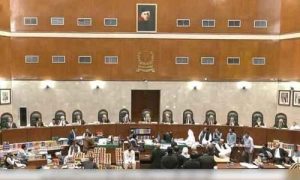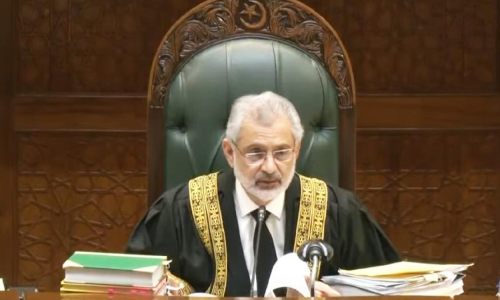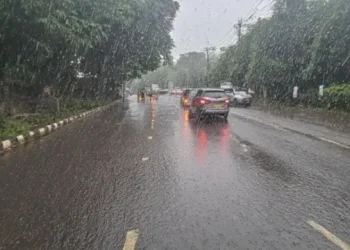ISLAMABAD: The full court of the Supreme Court, led by the new Chief Justice Qazi Faiz Isa, postponed the hearing on constitutional petitions against the Supreme Court Practice and Procedure Act until October 3. The hearing was televised live for the first time.
Chief Justice Qazi Faiz Isa, concluding the live televised proceedings, instructed the parties involved to submit their responses before the next hearing.
The full court bench, under the leadership of Chief Justice Qazi Faiz Isa, comprised Justice Sardar Tariq Masood, Justice Ijaz Ul Ahsan, Justice Syed Mansoor Ali Shah, Justice Muneeb Akhtar, Justice Yahya Afridi, Justice Aminuddin Khan, Justice Syed Mazahir Ali, Akbar Naqvi, Justice Jamal Khan Mandukhel, Justice Muhammad Ali Mazhar, Justice Ayesha A. Malik, Justice Athar Manullah, Justice Syed Hasan Azhar Rizvi, Justice Shahid Waheed, and Justice Musrat Hilali.

At the outset of the hearing, Justice Qazi Faiz Isa apologized for the delay, attributing it to the live broadcast of the hearing. He mentioned that the decision to telecast the proceedings live was part of a pilot project.
During the hearing, Chief Justice Isa emphasized his commitment to upholding the constitution and stated that he is bound by it, not by individual decisions. He highlighted the substantial backlog of 57,000 pending cases in the Supreme Court and questioned why parliamentary efforts to improve the system were not taking effect. He urged that if the law is flawed, it should be addressed within the framework of the constitution.
In response, petitioner’s lawyer Imtiaz Siddiqui requested time to provide answers to the questions raised by the Chief Justice.
Chief Justice Isa also encouraged the discussion to focus on constitutional matters rather than procedural rules. He questioned whether there was an intention to make the Chief Justice unaccountable, and he challenged what would happen if he did not accept such a proposal for ten years.
Attorney General Mansoor Usman Awan presented arguments on behalf of the government, emphasizing that the Supreme Court Practice and Procedure Act falls within the definition of ‘law.’ He pointed out the existence of these rules since 1980.
Chief Justice Isa pressed for more information, asking who formulated these rules. The Attorney General clarified that they were established by the Supreme Court in 1980.
The Chief Justice questioned the Attorney General about the composition of the Supreme Court, leading to a brief exchange in which the Attorney General mentioned that it included all the Chief Justices and judges, even when some might be “sitting at home.”
Chief Justice Isa reminded the lawyers of their duty to focus on the main points of the case, emphasizing that taxpayers support the judiciary to make decisions. He expressed concern that the discussion was veering away from the central issues.
Addressing the Attorney General, Chief Justice Isa acknowledged that he had made a mistake in his earlier remarks. He went on to ask who would be affected by this legislation and inquired about the potential consequences of the act. He highlighted the division of powers that this act has introduced concerning the Chief Justice of Pakistan.
Chief Justice Isa noted the significant financial loss incurred in the Rekodic case, amounting to 615 billion dollars.
It’s worth noting that Chief Justice Qazi Faiz Isa, shortly after assuming office, had convened a full court comprising all 15 judges of the Supreme Court to hear this case.
The background of the Supreme Court Practice and Procedure Act stems from a special meeting of the Federal Cabinet on March 28, 2023, which decided to legislate for judicial reforms. Subsequently, the bill was approved by the National Assembly and the Senate but was initially sent back by the President, who believed it exceeded the authority of Parliament. After further deliberation, the bill was eventually passed by Parliament and became law, although it faced legal challenges and suspensions along the way.
(Islamabad51-Newsdesk)














